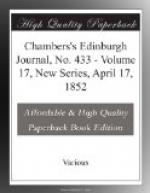We were curious to trace the feelings which actuated these ladies in devoting themselves to duties so apt to be repulsive to their class. Viewing the whole matter with a regard to its humane results, we did not doubt that benevolence was the impulse most concerned, directly or indirectly, though we of course knew that a religious sanction was essential to the scheme. In a conversation, however, with our conductress, we could not bring her to admit that mere humanity had anything to do with it. The basis on which they proceed is simply that text in which Christ expresses his appreciation of those who give a cup of cold water in his name. It is professedly nothing more than an example of those charitable societies which arise in connection with the Catholic faith, and in obedience to its principles, and which require that entire renunciation of the world which to a Protestant mind appears so objectionable. We have little doubt, nevertheless, that a certain amount of benevolence is a necessary, though it may not be a directly acknowledged pre-requisite for the profession; for it is admitted that some novices find that they have not the vocation, and abandon the attempt; while others, by the grace of God, are enabled to go on. We cannot regard this idea of ‘vocation’ as something entirely apart from the inherent feelings.
So far as we could understand, the Sisters regard more expressly the value of the act of obedience to the injunction of Christ, than the feeling from which, we would say, the injunction sprang—an error, as we most humbly think, though one of a kind which we do not feel called upon to discuss in the presence of results so much in accordance with our own best feelings. We would only say, that there is something disappointing in finding how much the whole procedure is beheld by these self-devoting women, as reflecting on their own destinies. It appears that their patients often grumble both at the food and the attendance which they receive. The Sisters say, they like to meet an ungrateful old woman, as it tries their humility and forbearance: it makes the greater merit towards an end in which they themselves are concerned. Now, we would put all this aside, and think only of the divinely recommended sentiment of the text, as calculated in some degree to make our life on earth an approach to that of its author. It is really hypercritical, however, even to intimate these dissenting remarks, especially when our main end is, after all, merely to bring the public into knowledge of an extraordinary phenomenon in human conduct, going on in an age which seems generally of so opposite a character.




